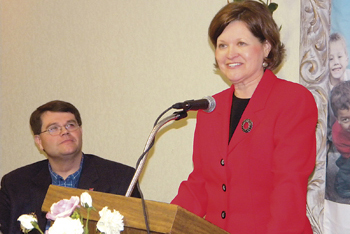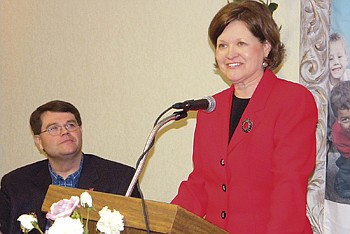 Staff Photo by Randall Higgins/Chattanooga Times Free Press
Tennessee Supreme Court Justice Sharon Lee speaks to the Cleveland Kiwanis Club about the court's Access to Justice Commission and how the court system must be available to everyone. Chris Newton, club program chairman for the month, left, introduced the speaker.
Staff Photo by Randall Higgins/Chattanooga Times Free Press
Tennessee Supreme Court Justice Sharon Lee speaks to the Cleveland Kiwanis Club about the court's Access to Justice Commission and how the court system must be available to everyone. Chris Newton, club program chairman for the month, left, introduced the speaker.CLEVELAND, Tenn. -- Tennessee's courts should be available to everyone, without barriers, state Supreme Court Justice Sharon Lee said here Thursday.
Lee said the Tennessee Supreme Court's Access to Justice Initiative was formed to address a growing gap between those who can afford an attorney in civil cases and those who cannot.
"A big part of the judiciary's budget is to appoint counsel for people in criminal cases, and that's critical," Lee told members of the Cleveland Kiwanis Club. "But if you go to court and you are dealing with whether you are going to keep custody of your kids, you don't get a lawyer for that. If you can't afford a lawyer, it puts you in a very bad situation."
During hard economic times, she said, "we are seeing more and more people representing themselves. That puts a strain on the system, a strain on the trial judges to try to make sure those people, who don't know the law, don't shoot themselves in the foot."
The Access to Justice Commission was formed in 2009 and a strategic plan created in 2010. Part of that plan was a pro bono summit earlier this year. Attorneys are asked to devote some of their time for free.
Chief Justice Cornelia Clark told lawyers at that summit that pro bono service is needed "if we are to have any hope of providing liberty and justice for all," according to the Supreme Court website.
Clark was Thursday's scheduled speaker here but snow interrupted her travel plans.
Public defender Richard Hughes asked Lee about civil case access.
"In my office, people obviously facing incarceration have a constitutional right to counsel," he said. "That's not in place in civil court."
Retired Judge Andrew Bennett said, "We will never have enough money to pay for a lawyer for everyone who needs one."
He suggested courts allow "friends who may have more knowledge" to speak for others.
